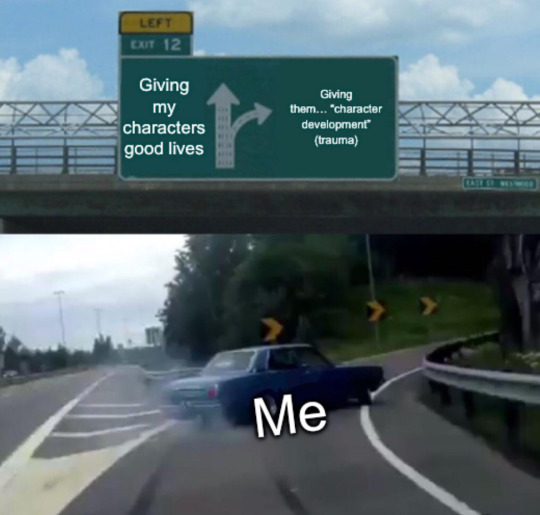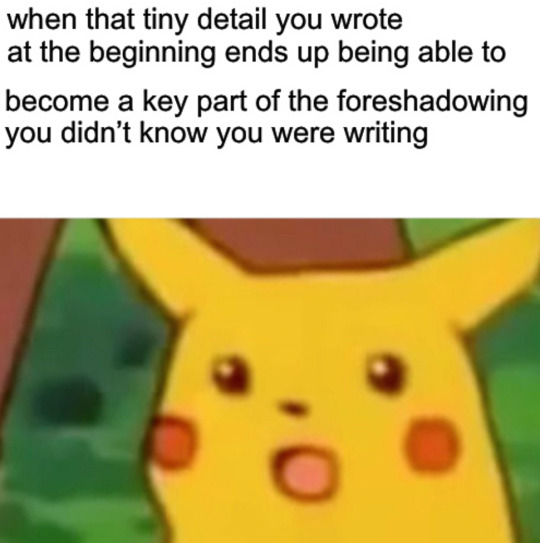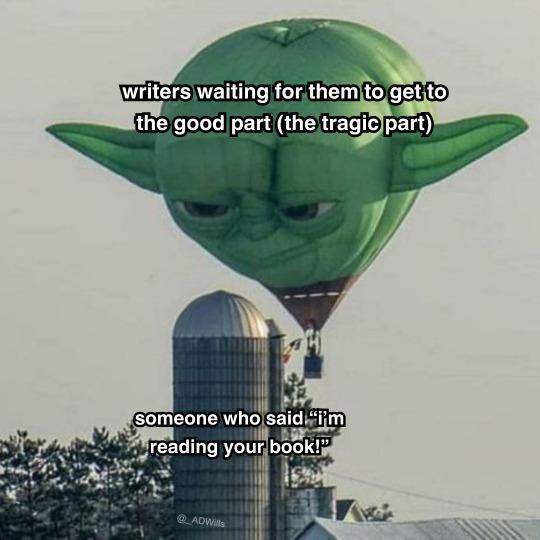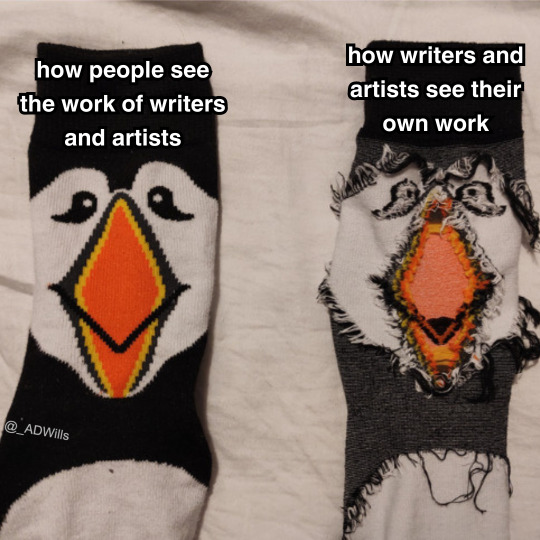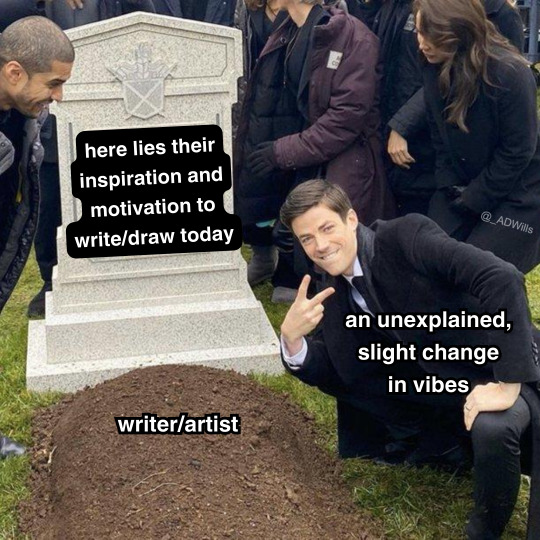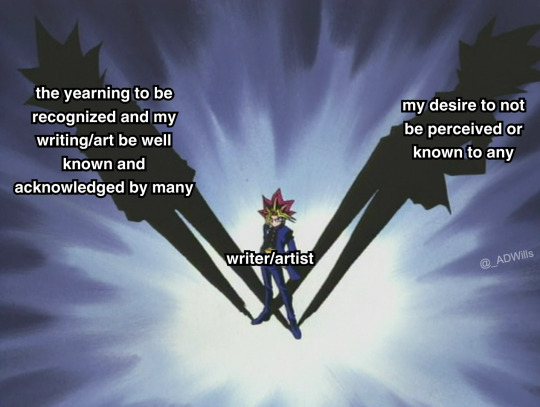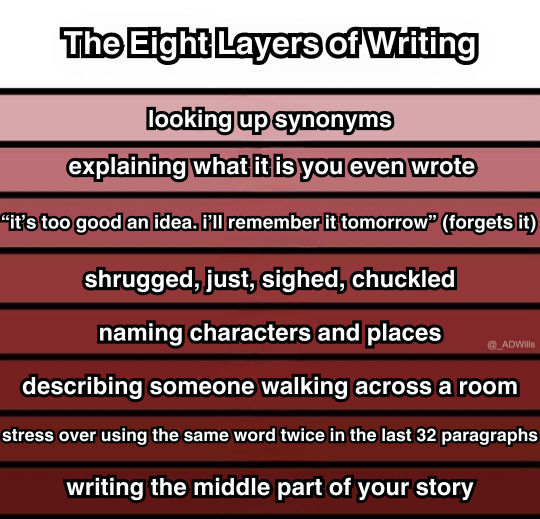Text
Writing is exactly like this
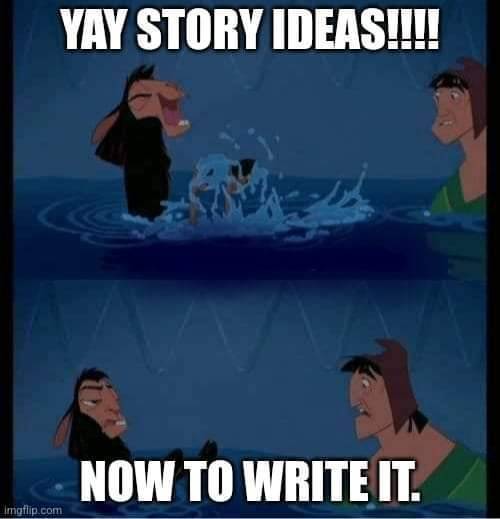
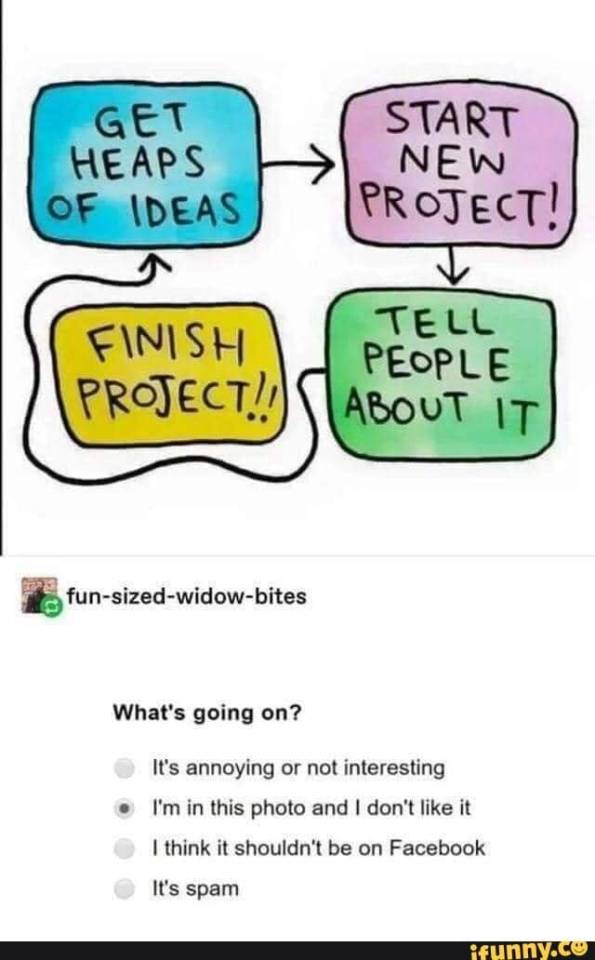
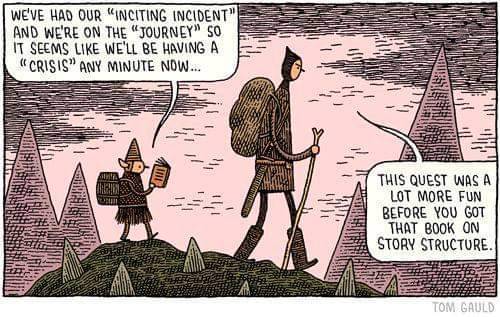

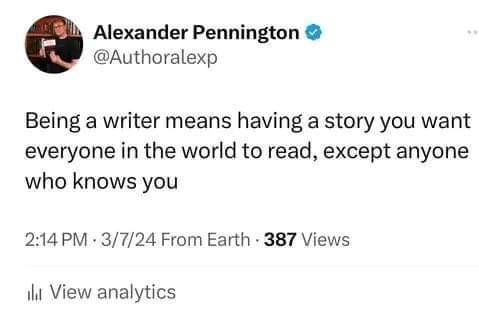
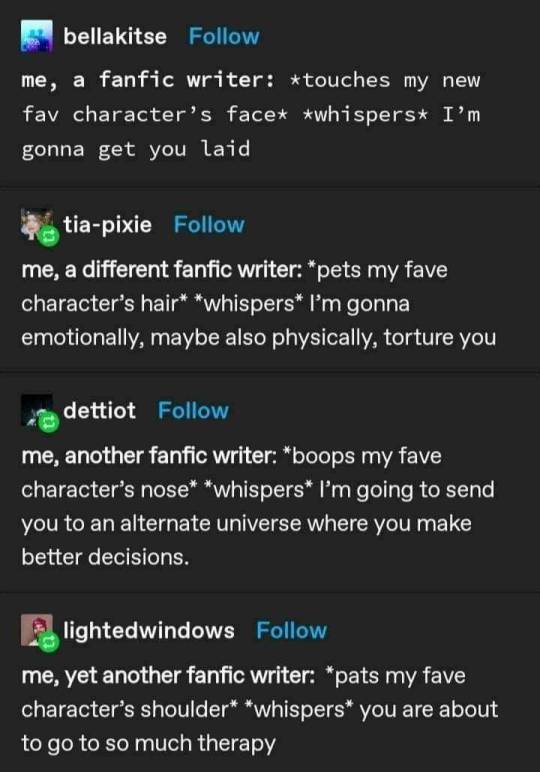
Writer's Corner
4K notes
·
View notes
Text
So I just saw a post by a random personal blog that said “don’t follow me if we never even had a conversation before” and?????? Not to be rude but literally what the fuck??????????
I’ve had people (non-pornbots) try to strike conversation out of nowhere in my DMs recently, and now I’m wondering if they were doing that because they wanted to follow me and thought they needed to interact first. I feel compelled to say, just in case, that it’s totally okay to follow this blog (or my side blog, for that matter) even if we’ve never talked before.
Also, I’m legit confused. Is this how follow culture works right now? It was worded like it’s common sense but is that really a thing?
113K notes
·
View notes
Text
Katara and Mutuality in Relationships
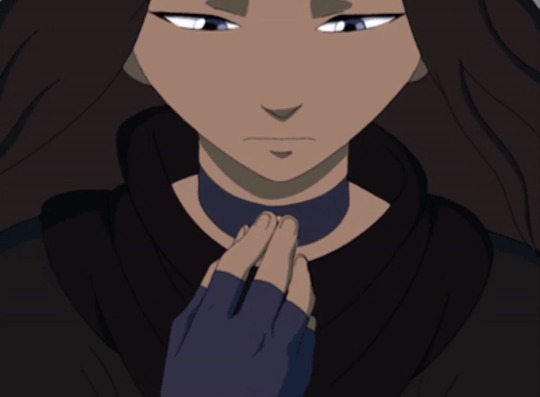
There are lots of conflicting opinions about which characters Katara felt attraction towards, which characters she didn’t, and how long she felt that attraction. I see in most cases, people point to quick clips of her faintly blushing or kissing another character on the cheek as evidence, but I think these kind of takes miss the nuance of the purpose attraction serves in a story.
Most importantly, I see these characters treated as if they are actually people capable of making their own decisions. It’s important to remember that these are fictional characters. They don’t make their own choices; the writers make their choices for them for the purpose of telling a story. From that standpoint, it’s more valuable to examine how a character’s story and narrative themes tie into their relationships with other characters. Animators can shove in a kiss or a blush wherever they want, but it’s harder to demonstrate through storytelling how and why two characters might feel attraction towards one another, and how a relationship between them would develop both characters and contribute to the overarching themes of the story.
In other words, when discussing which characters Katara is “attracted” to, I’m discussing which relationships and actions within the narrative build on her established story and arc. Romance is always integrated into a story for a reason, and considering that reason is important.
Unfortunately, ATLA is very much a product of its time in this way. It’s easy to see what romance adds to the arcs of the male characters—but not so much with the female characters. All three canon relationships (kataang, sukka, and maiko) follow this trend to some degree. The primary purpose of the woman in this narrative is to act as a prize for the man for performing some good deed. Once they’re together, she ceases having her own motivations and becomes an extension of the male character she’s dating. This is pretty blatant with Suki—she barely had a personality in that later seasons; she is there to be Sokka’s girlfriend. Similarly, Katara becomes a completely different character—she’s even animated differently—when the narrative pushes her into romantic scenes with Aang. Her character is flattened.
So what is Katara’s arc, and how do the romantic interactions she has throughout the series contribute to this?
Well, that could be a whole other essay itself, but to put it simply, Katara’s arc is one of a young girl devastated by grief at a young age clinging to hope that she has the power to fight and change the world for the better. Which she does as she gains power and confidence throughout the series—culminating in her defeating Azula in the finale.
But the part I want to focus on here is how Katara connects with other characters. She connects with them over shared experiences of grief and loss.
Take Haru, for instance.
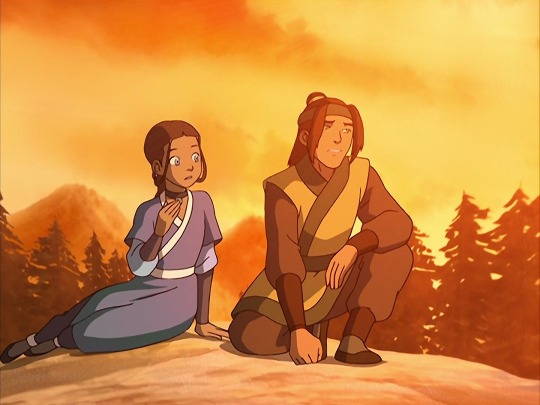
Haru: After the attack, they rounded up my father and every other earthbender, and took them away. We haven't seen them since.
Katara: So that's why you hide your earthbending.
Haru: Yeah. Problem is…the only way I can feel close to my father now is when I practice my bending. He taught me everything I know.
Katara: See this necklace? My mother gave it to me.
Haru: It’s beautiful.
Katara: I lost my mother in a Fire Nation raid. This necklace is all I have left of her.
Haru: It’s not enough, is it?
Katara: No.
This isn’t just a throwaway moment; it’s an important character moment that leads up to growth and the progression of Katara’s overall story, both in this individual episode and in the whole series.
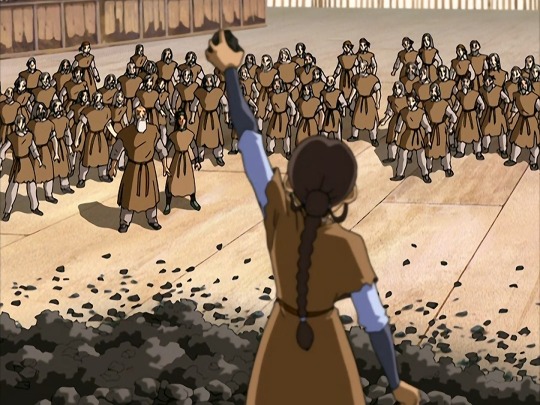
Katara finds her power in the connections she’s able to make with other characters. It’s a powerful driving force for her that makes her a strong character even before her bending abilities develop. Imprisoned was such an important episode to establish who Katara is and what her power is, and adds so much to her arc.
But there is one line in particular from the above exchange that also stands out: Haru says “it’s not enough, is it?” and Katara agrees. Even this early in the series, we’re establishing the fact that despite her drive and hopeful outlook, Katara feels deeply hurt, she feels a deep sense of loss that she opens up about to other characters in moments like these. But unlike Haru…Katara can’t go rescue her mother. Her mother is dead, and we see her grapple with that grief throughout the series.
Another character she reaches out to like this is Jet.
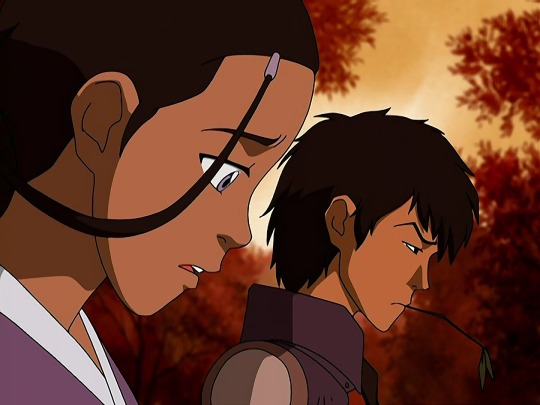
Jet: Longshot over there? His town got burned down by the Fire Nation. And we found The Duke trying to steal our food. I don't think he ever really had a home.
Katara: What about you?
Jet: The Fire Nation killed my parents. I was only eight years old. That day changed me forever.
Katara: Sokka and I lost our mother to the Fire Nation.
Jet: I’m so sorry, Katara.
Another important note about Jet is that there are explicit romantic feelings from Katara in this episode. Again, Katara empathizes with another character through a shared sense of loss. Sadly, in this case, Jet manipulated her feelings and tricked her into helping in his plot to flood the village…but those feelings were undeniably there.
That was the tragedy in this episode, but it also gives the audience so much information about Katara as a character: what motivates her, and what she wants. Katara is established as a character who wants someone who will connect with her and empathize with her over her loss—her greatest sense of trauma. She wants to help others but also receive support in return. The reason why she was smitten with Jet, beyond just initial attraction, is because he gave her a sense of that before Katara realized his true motivations.
A lot of people make the claim that Aang is good for Katara because he also feels a sense of great loss and trauma. And while on paper that’s true…does he really demonstrate that? I just gave two examples of characters Katara connected with this way, and both responded with deep empathy to what she said. Very early on in the show—the third episode—Katara attempts to connect with Aang the same way. How does he respond?
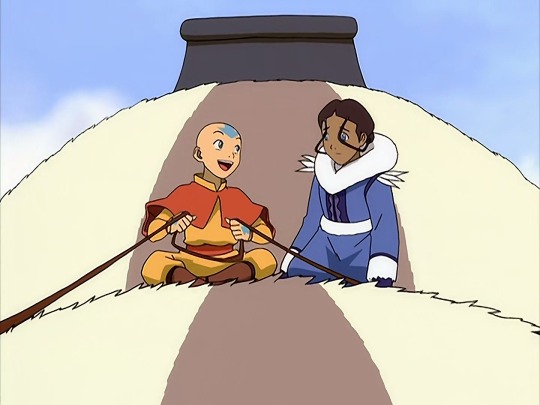
Katara: Aang, before we get to the temple, I want to talk to you about the airbenders.
Aang: What about 'em?
Katara: Well, I just want you to be prepared for what you might see. The Fire Nation is ruthless. They killed my mother, and they could have done the same to your people.
Aang: Just because no one has seen an airbender, doesn't mean the Fire Nation killed them all. They probably escaped!
Just compare this exchange to Haru and Jet. No effort to empathize, not even a “sorry for your loss” or anything. It’s a stark contrast, and the reason for that is because this narrative entirely centers Aang. Katara’s narrative always seems to be secondary to his when they’re together—which is exactly my point when I say this relationship has a fundamental lack of mutuality. It’s built that way from the beginning of the series. It does not add to Katara’s arc nor establish what about this dynamic would attract her.
And, look, before someone jumps down my throat about this…I’m not saying Aang is a horrible person for this response. I think it’s a sign that he’s immature and has a fundamentally different approach to problems than Katara. Katara is a character who has been forced to take on responsibilities beyond her years due to being a child of a war-torn world. Aang’s approach to problems is avoidance while Katara never had that luxury. It doesn’t mesh well.
This is all in Book 1. I honestly could have gotten on board with Kataang if the series meaningfully addressed these issues…but it didn’t. In fact, they actually got worse in some ways.
Back to Katara’s mother. We’ve established that this is a core part of Katara’s character and like in the scene with Haru, she indicates that this is an unresolved issue that pains her. But then, in Book 3, Katara actually does get a chance to confront this pain.
This would have been a powerful moment. Surely the character who is meant to be her partner, her equal, would have been there for her. Surely he would have understood and supported her, fulfilling her narrative and adding to her story.
But Aang didn’t do that. I won’t go into details because there are a million analyses out there on The Southern Raiders, but Aang’s response to Katara was the opposite of understanding. He got angry with her, insinuated that she was a monster for wanting revenge, and tried to dictate her behavior according to his own moral values. And importantly, from a narrative standpoint, he did not go with Katara. One of the most important events in her arc, and Aang didn’t support her—he actually tried stopping her. He didn’t contribute to her growth and development.
Also noteworthy:
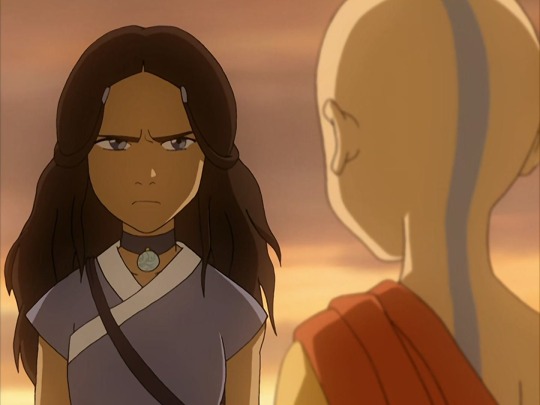
Katara: But I didn’t forgive him. I’ll never forgive him.
Even at the end of the episode, Aang clearly doesn’t understand at all what Katara is feeling. This line demonstrates it perfectly. He thinks she forgave him when that wasn’t the case at all…but of course, he didn’t even accompany her, so he didn’t see what actually took place. His worldview is fundamentally different from hers, and he’s consistently too rigid in his morality and immature to center Katara’s feelings.
Throughout Katara’s whole arc, her most significant character moments, Aang’s character just doesn’t come through the way Katara’s constantly does for him. Their narrative lacks mutuality. When Katara and Aang are together, she becomes an accessory to him. The ending scene is a perfect demonstration of this.
Now, to address the elephant in the room.
Which character does actually add to Katara’s narrative and support her growth as a character?
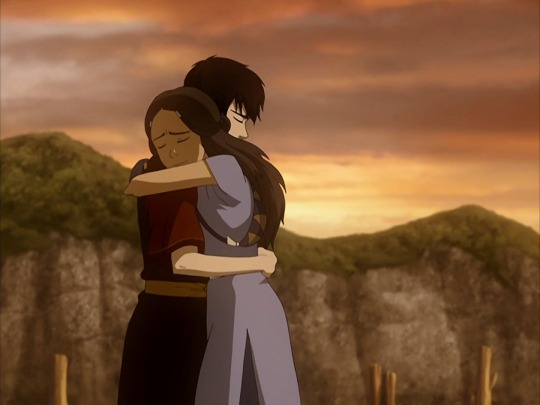
Correct! I just talked about how important The Southern Raiders is to Katara’s character and story, how it’s a chance for her to finally address the grief she’s been carrying since Book 1. And who stood by her side throughout this pivotal moment? Right—Zuko did.
You can talk all you want about how he’s a “colonizer” while Aang’s people suffered genocide, but you’re forgetting that “show, don’t tell” is one of the most basic aspects of storytelling. The fact is, despite how it looks on paper, Zuko was the one there for Katara at her critical moments. Zuko empathized with Katara more than Aang ever did—as demonstrated in this episode. Zuko never once brought up his own cultural values. Zuko never once told Katara what to do. Zuko’s position was that Katara should be the one to decide, and that he would support any choice she made. He supported her decision to spare Yon Rha, but he would have also supported her if she decided to kill him. I actually found this episode to be a satisfying reversal to what is typically seen in TV—for once, the female character is centered while her male counterpart takes the backseat and becomes a supporting role to her narrative.
Even before this, Zuko is shown to empathize with Katara.
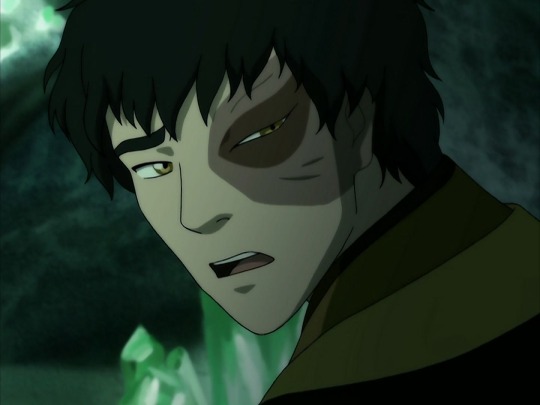
Zuko: I’m sorry. That’s something we have in common.
I think what gets me about this scene is the fact that he’s still Katara’s enemy, and she was just yelling about how she hates him and his people. But despite that, Zuko still empathizes with Katara. She is fundamentally human to him, and he expresses that to her in a way that allows them to connect. Zuko stands to gain nothing from this. It’s true that Azula entered the picture and twisted things around—but in this moment, Zuko’s compassion is genuine. His instinct was to respond to her grief with empathy, just like she consistently does for other characters.
And finally, how else does Zuko add to Katara’s arc?
I don’t think there is any more perfect of an example than the finale itself—the culmination of the arcs and development of all characters.
Zuko and Katara fight together. In a heartbeat, Zuko asks Katara to fight by his side against Azula, because he trusts her strength. She’s his equal—both in his mind, and in a narrative sense.
Then, this:
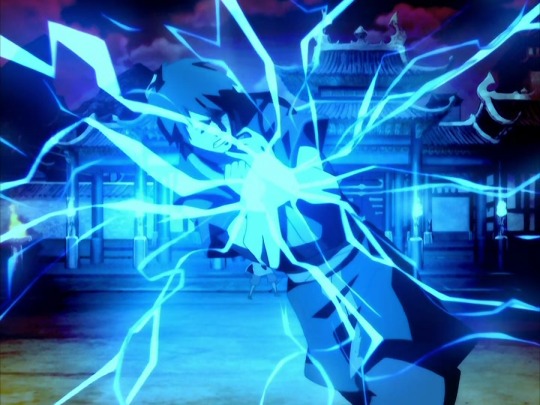
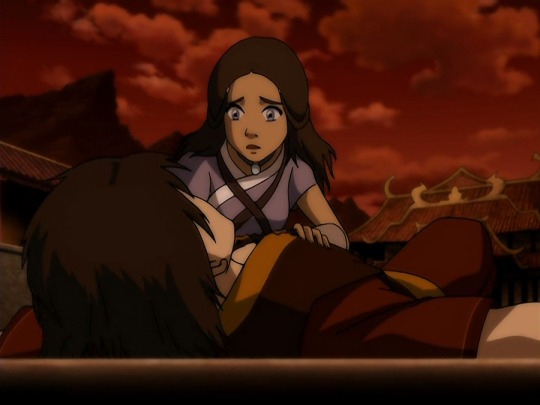
Both of their roles are so critical in this fight. They both save each other. The scene has such raw emotion to it. These characters were together at the conclusion of their respective arcs for a reason.
This is the perfect conclusion to Katara’s arc. She just played a critical role in ending the war that has caused her trauma her whole life. She just demonstrated her mastery of waterbending (another thing she’s dreamed of throughout the series) by defeating the world’s most powerful firebender during Sozin’s Comet. Even though she had help as all characters do, these are victories that belong to her and demonstrate the growth and power of her character. And to top it all off? She was able to save Zuko’s life. She didn’t have to endure the pain of feeling helpless to do anything while someone else died for her; this time, she had an active role, she changed her fate, and she prevailed. Zuko plays an important role in Katara’s story without dominating it. They perfectly represent mutuality. They add to each other’s stories. Their narratives become stronger when they’re together, without one diminishing or sidelining the other.
So, from that standpoint, that’s why I always see the attraction between Zuko and Katara and why I see it lacking between Aang and Katara. Zuko and Katara’s story doesn’t need some cheap little throwaway moments to shine. It’s integral to both characters’ stories. We are shown not told of the way these characters feel about each other. Given everything we know about Katara, her goals, her values, her past loves…absolutely everything points to Zuko being the true subject of her feelings.
Because let’s be honest. The ending I just described is so much more powerful and so much more Katara than seeing her being relegated back to a doe-eyed love interest for Aang to kiss. It hardly even made sense—Katara played no role at all at the culmination of Aang’s arc. She was relegated back to a love interest, rather than the powerful figure we saw fight alongside Zuko.
714 notes
·
View notes
Text
How to learn real astrology: what it is and is not
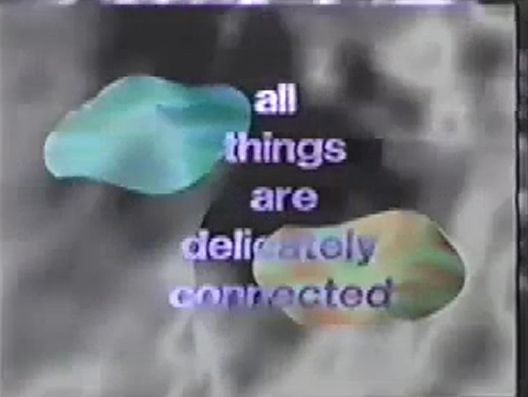
As above, so below, as within, so without, as the universe, so the soul.

It is VITAL that if you want to understand astrology properly, you come in with an open mind and forget everything you think you know. Especially, remove yoruself from the belief that astrology is some occultic mystical spiritual practice, and/or that it is solely some psychological tool.
I used to be quite the hater of astrology. None of it 'resonated', and it seemed like wishy washy hippie shit. In lockdown, astrology stuff kept coming onto my feed, and some of it made sense, but most still did not. I then initially wanted to debunk astrology. But when I properly stated looking into it, the deeper I went the more accurate it started to become. Equally, parts still remained highly inaccurate. But this was due to a mismatch of how 'influencers' out there synthesised and understood the traditional foundations of astrology and modern information. Thus, I committed myself to truly understanding astrology, and my life has significantly improved for it and I've only just started.
As an introductory post to what astrology really is, I have formatted it into the following sections: i. the problem with pop culture astrology, ii, the history of astrology, iii. how astrology works, and iv. where meaning in astrology comes from.

The problem with pop culture astrology
This is the type of astrology we see in newspaper horoscopes, online articles, tiktok viral posts, instagram horoscopes, etc.
This is borne out of the allure astrology holds for desperate individuals seeking an easy and quick answer to their life problems, and using it as a form of confirmation bias for hating their ex (for example). But this misuse of astrology will undoubtedly hit for most people, due to the barnum effect, but is ultimately inaccurate and those who think it true have now misleadingly correlated the pop culture reasons for why X happened to what astrology is.
The new moon in your 7th house is not a sign that your crush will leave his partner for you. Being a gemini sun does not mean you are a two faced, loyal-less individual. Having your sun sign the same as their venus sign does not mean you two are compatible. And so on and so forth.
Here are some key things to understand about astrology:
✎ Stop using co-star, and those websites which give you your astrology information like this:

-> This does not tell you anything remotely significant aside from standard archetypal and superifical meanings of having a sun in Sagittarius or whatever (which you might not even 'relate' to, because of a multitude of other factors this does not show). Your chart instead, should, at the very least look like this:
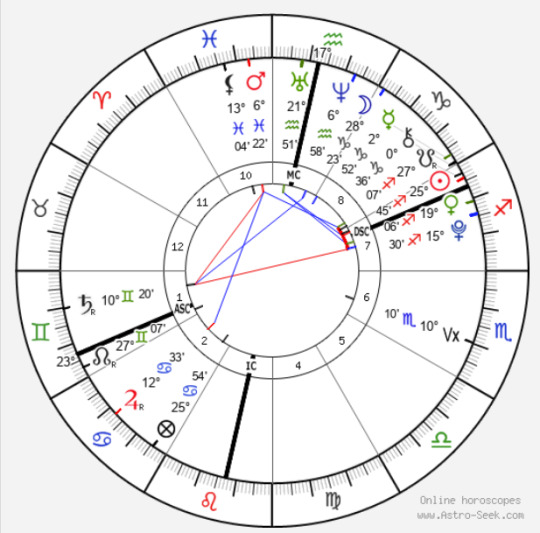
-> Even better, make a chart and add in decans, asteroids, and considers more aspects. Viewing your birth chart like this is essential for gaining a better understanding. Aspects are what brings everything in your chart together to give it more significant and individualised meaning, the houses and the angles are also explicitly identifiable this way. Also, always make sure your chart is in whole sign houses, I will make a post on this later on why, but you will have to go to settings for this as popculture astrology has made placidus the default (as well as other inaccurate takes).
✎ Sun sign is astrology is fake, no matter how much you think it resonates with you it is the wrong footing to base your understanding of astrology off of. Astrology is extremely complex, one thing might resonate for one person and not for another, because of house placements, condition of the planet, aspects to the planet, etc. Consequently, all basic and simplified delineations of a chart are unhelpful and will put you on the wrong footing for future proper readings you might wish to do. This is how astrology can be so inaccurate.
✎ Astrology is not about resonating. Although, this is a part of how we can test astrology, it is linked far too much with resonating with personality. Your birth chart is not a map of who you are specifically, we evolve all the time (as the universe, so the soul), it is a map of your entire life. It is a map of the sky and its energies the minute you were born. Some things you think you do not resonate with is because those energies have not yet played out in your life.
✎ Astrology is not a psychological tool, although it can give us insight into psychology when used and understood properly. Again, it is the blueprint of our life.
✎ Astrology is not spiritual. It is not a belief system, either. Although, one can use astrology to advance their spiritual practices.
✎ Free will exists. I will likely go into this in another post but the energies of our bith chart, solar return chart, profection year, progressed charts, transits etc, are merely indications of how things are likely to unfold. The energies are malleable within their themes' ambit, and it is up to us to decide how we choose to interpret what is/will happen and what to do with that information. A transit might indicate difficulty in a law suit, ok, how can I mitigate that then? What other charts, energies, and transits can I use? If I did not know of this then I would not know how to alter my behaviour to yield a better results, even if it might not mean a completely opposite result.
✎ Your natal chart will not show you everything. There are relocated charts, progressed charts, solar return charts, profection years, etc. All this goes into a holistic assessment. Your natal chart, however, will always remain the anchor of it all.
A brief history
Astrology is not some woo-woo, spiritual, new age, belief system. Astrology's history and use goes back to the Babylonians. It used to be intertwined with astronomy; Galielo and Kepler, for example, were simultaneously astrologers and practised it widely (even as court astrologers). People in positions of power have always consulted astrologers to time events, in the modern era many Royal families, celebrities, and politicans still consult astrologers. Carl Jung, JP Morgan, Nancy Reagan, and Roosevelt are examples of this. Of course, it might be argued that just because famous people have used/use astrology does not give it any more credit to which I say: ok please read my post below pls and ty xo.
Astrology's history has been relatively tumultuous, however. I have condensed this timeline from an article I found below:
- Astrology was a widely accepted practice but, in Europe, after the fall of the Roman empire and much of Europe, it fell into decline along with other disicplines. - The middle ages saw a renaissance of intellectualism with a particular focus on science and thus the astronomy part of it. This was largely due to the Church who viewed astrology as divination and going against free will. - However, in other parts of the world astrology was still a crucial element of daily life, and those in power would use astrologers to time events. - Astrology did re-enter the curriculum, though, in the 14th century, with a focus on being used for medical astrology in part due to the recently available Hippocratic Corpus. These texts were crucial to advancing our understanding of medicine, but Hippocrates emphasised that "a physician without knowledge of astrology has no right to call himself a physician". Astrologer still had a healthy dose of criticism back then, though. - Astrology was a major field of study in universities in Europe, well ingrained in daily life. - It died out in the 17th century, mostly due to the increasing emphasis on science being increasingly and misleadingly viewed as separate from astrology, the church, and astrologers falling into disrepute due to political involvement. - Its resurgence in the 19th century saw an oversimplified, and largely 'spiritualised' version of astrologer. This is because this period also saw an increased interest in the occult and mystic. - Since becoming conflated, astrology has become even further diluted, but this is not to say that every new discovery has been wrong; modern interpretation is crucial to informing the bigger picture of astrology and how we can utilise it. But it is vital to be critical and separate it from pop culture nonsense, aimed at lost and desperate people looking for quick answers and confirmation bias, and have some media literacy.
So, how does astrology work?
: ̗̀➛ Astrology has NOTHING to do with the physical constellations. Astrology is based on the signs on the ecliptic (the path of the sun amongst the constellations, which is the plane of the earth's orbit).
: ̗̀➛ However, the ecliptic has 15 constellations, not 12. This is because babylonians divided the ecliptic into 12 equal segments of 30 degrees each thousands of years ago. The physical constellations were just used to identify where in the sky each sign would be, at the time for ease of astronomical mapping/calculation - it is merely symbolic.
: ̗̀➛ Another reason why they are not based off the physical constellations is because the actual size of the constellations vary massively in size. Below is a representation of this:
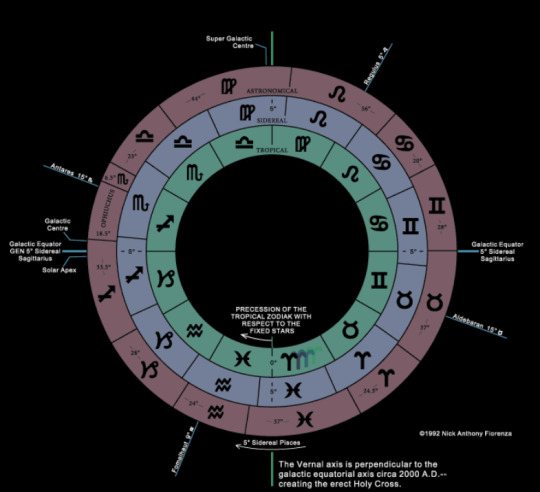
: ̗̀➛ As you can see, Virgo, for instance is huge, and on a literal view overlaps into the next segment because the constellations do not all equally fit a 30 degree division. Yet, we do not give scorpio like 5 days for its season, because the physical constellation does not dictate anything meaningful.
: ̗̀➛ Opphiuchus is not a 13th zodiac sign, and it has been known for centuries. This is why there are not 15 zodiacs despite there being 15 constellations.
This gives us the tropical zodiac, which is to do with the earth's seasons:
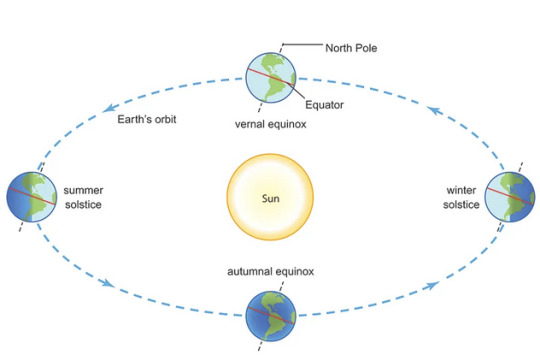
: ̗̀➛ The solstices are therefore reference points for Capricorn and Cancer (tropic of capricorn and tropic of cancer), not the constellations themselves. Accordingly, the spring equinox is marked by Aries (with the sun entering the segment of Aries at 0 degrees until 29), and the autumn equinox by Libra.
: ̗̀➛ The precession of the equinoxes, are therefore irrelevant to astrology (and this is why vedic/sidereal is, in my opinion inaccurate). The slow change of the direction of the earth's axial tilt, over around 26000 years, cause a precession of the equinoxes. This means, the segment of the sky that used to be identified by the Aries constellation from the earth's position at the time, is now looking at Pisces. But as we know, astrology has nothing to do with the physical location of the constellations. Vedic astrologers use sidereal positioning, aka taking into account the precession of the equinoxes, yet they still divide the ecliptic in the same way. This causes problems, leading to many branches in vedic because few agree on where aries actually even starts. But, I will write an extension of this segment in a future post on tropical vs vedic/sidereal astrology.
Where does astrological meaning come from?
As explained above, constellations do not give us meaning, the planets in the signs do (of which the signs' names just derive from where the constellations were at the time, i.e. are merely symbolic).
Astrology operates in a heliocentric context, in that its setting is derived from the solstices (as the sun is what gives us life) and the ecliptic etc, but is geocentric in function in that the meaning comes from how the celestial bodies going through the signs affect us on earth; it is all about OUR relation to the planets, not constellations.
Returning to the quote above (as above so below...), what happens up up there reflects its energies down on us below. For thousands of millenia, astrologers have developed an accurate pattern recognition framework which aligns with the maths and astronomy. This was done using the ephemeris, which tracked the trajectory of celestial bodies against the context of worldly (mundane), or natal events. Eventually, this knowledge could be used for predictions, (to understand transits, or for electional and horary astrology), by utilising the knowledge of how the trajectories of the planets and their interactions with eachother in what sign and house affected what.
Why does it affect us? Well, all the things that happen above us radiate energies. But when I talk about energies, I do not mean it in some spiritual sense, it is quite literal. Everything has frequencies. As mentioned above, astrologers, since the Bablyonian times, have studied these patterns and created an objective framework to align with it. Physical energies or not there is direct causation. The moon for instance, affects the tides on the planet because of its gravitational pull. We are 70% water, there is little reason to deny that the moon cannot affect us either (it does). Perhaps you might understand your broken leg as because of being hit by a car. But astrology can assess the chart of the event, and transits to your own chart to provide further explanation of why you got hit by a car in the first place, and why it caused a broken leg etc. Subsequently, the energies of what happens above relate to the themes found in planets, signs, houses, aspects, asteroids etc - but these energies are not set in stone as explained above.
Ultimately, it is disappointingly small-minded to think that there is nothing 'greater' than the physical reality we tether ourselves to. We are in fact part of something bigger; and again I do not mean this in some culty spiritual hippy sense. It is literally a fact, the world and cosmos at large is so vast, mysterious, and beautiful, how could anyone deny the interconnected web we are all collectively a part of. We might never fully understand the mechanisms of the universe, but what we can do is use the information we do have to make use of it and help inform us on how to live better lives. The fact there is something 'greater' inherent in our lives, connecting everything, which is objectively difficult to truly grasp, is not a reason to reject it. A lot of people who are averse to astrology (which used to be me) are those who pride themselves on rationality and objectivity, yet are restricting themselves to a very particular interpretation of what rationality and objectivity means.

With all this said, I hope it has helped someone understand and appreciate astrology better. There is such a fascinating rich and deep history to it, spanning various cultures and eras, making it difficult to at least not enjoy learning about even if one still chooses to not practise it. I would like to reiterate, however, that to truly embrace astrology and its millenia of knowledge, evidence, and practice behind it, one must divorce its concept from pop culture astrology.

175 notes
·
View notes
Text

"Yeah, I'd write my story, but..." - me, on a daily basis
(screencap from Star Wars: The Last Jedi)
1K notes
·
View notes
Text
“omg you’re so creative. how do you get your ideas” i hallucinate a single scene in the taco bell drive thru and then spend 13 months trying to write it
132K notes
·
View notes
Text
Some writers: *meticulously plan out every plot point and the tone and meanings before they start writing*
Me:

50K notes
·
View notes
Text
the question, you see, is not ‘is it too ooc for this character to cry’ but rather ‘what circumstances would push this character to cry’
this is the whump wisdom, go forth and make that character cry
18K notes
·
View notes
Text
That moment when the unrelated scenes you've been writing for two weeks both somehow connect (i have no idea how this happened)
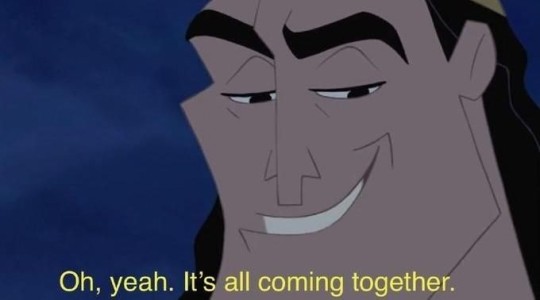
11K notes
·
View notes
